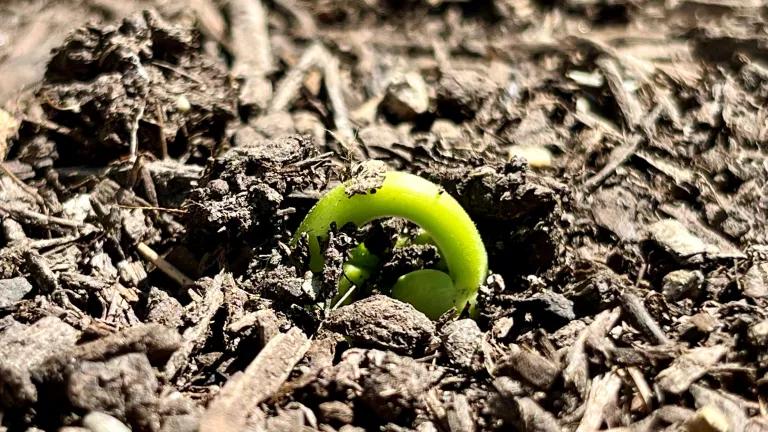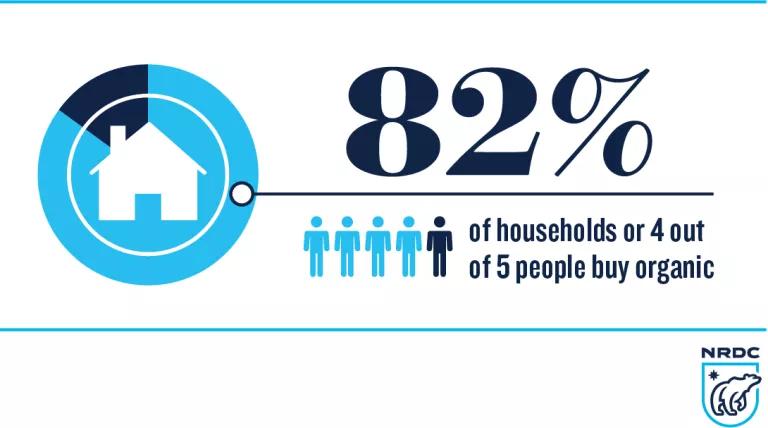The Farm Bill Needs Opportunities in Organic
The Opportunities in Organic Act will put organic in reach for more producers and consumers.

A bean sprouts in Oakland, California
Allison Johnson
Update (May 24, 2023): Representatives Jimmy Panetta and Alma Adams introduced the Opportunities in Organic Act (H.R. 3650) today, cosponsored by Reps. Suzanne Bonamici, Zoe Lofgren, Jim McGovern, Donald Payne Jr., Chellie Pingree, and Andrea Salinas. This important legislation would revamp the existing Organic Certification Cost-Share Program into a comprehensive Opportunities in Organic Program that puts organic in reach for more farmers, ranchers, and families.
The bill is supported by a wide range of farming, environmental, and health organizations across the country, including: Agriculture and Land-Based Training Association, Carolina Farm Stewardship Association, Center for Food Safety, Environmental Working Group, Farm Action Fund, Friends of the Earth, Georgia Organics, Maine Organic Farmers & Gardeners Association, Midwest Organic Services Association, National Organic Coalition, National Sustainable Agriculture Coalition, National Young Farmers Coalition, Northeast Organic Farming Association of NJ, Northeast Organic Farming Association of NY, Northeast Organic Farming Association of VT, Ohio Ecological Food & Farm Association, Oregon Tilth, Organic Farmers Association, Organic Farming Research Foundation, Organic Seed Alliance, Pennsylvania Certified Organic, Rural Coalition, Union of Concerned Scientists, Western Organic Dairy Producers Alliance, and Wild Farm Alliance.
It’s Farm Bill season, and this year, we need to seed more organic agriculture – starting with the Opportunities in Organic Act (S. 1582), introduced today by Senator Peter Welch and twelve other Senators (with a House companion led by Congressman Jimmy Panetta expected soon). The bill would invest in comprehensive and easily accessible tools that remove barriers for organic and transitioning farmers – and entice more to join them.
The Farm Bill shapes our food and farming system, by directing hundreds of billions of public dollars, as well as setting farm policies. The federal law that strictly defines organic agriculture was adopted in the 1990 Farm Bill, setting in motion decades of growth in a food sector that protects public health and the environment.
Even so, organic hasn’t received the same levels of public investments that other parts of our agricultural system receive from the Farm Bill – and it shows. Four out of five U.S. households regularly purchase organic food, and consumer demand for organic surpassed $67 billion in 2022. But only 1% of our agricultural land is certified organic, and the U.S. remains a net importer of organic products.

Grow Organic: The Climate, Health, and Economic Case for Expanding Organic Agriculture, available at https://www.nrdc.org/resources/grow-organic-climate-health-and-economic-case-expanding-organic-agriculture
Food and farming businesses need a meaningful support system to make the jump to organic and meet this strong demand.
It takes three years for a farm to transition to organic, from when the last synthetic pesticide or fertilizer is applied to the land to when the farm can use the “organic” label. Farmers face a wide range of farming and business risks during that period, before they receive market benefits of their effort. While organic farms are ultimately more resilient and profitable in the long-run, they may see changes in pest and disease pressure as they adopt a new approach to building healthy soil and yields may fluctuate for several years until they reach a new equilibrium. Farmers need financial and technical assistance tailored for organic production to help them ride out these bumps, and the Opportunities in Organic Act will make these flexible resources available.
Access to organic processing and distribution infrastructure also remains a barrier for many producers, particularly in areas of the country that don’t yet have a critical mass of organic production. In addition to supporting organic farming practices, the Opportunities in Organic Act will make funding available to support organic supply chain development – from on-farm equipment and infrastructure that will help farms grow their businesses to organic facilities that can serve producers throughout a region.
Building on the successful Organic Certification Cost-Share Program and USDA’s Organic Transition Initiative, the Opportunities in Organic Act will reduce barriers to organic in three ways:
- Update the existing organic certification cost-share program that reimburses organic operations for a portion of certification costs
- Cost-share payments that cover 100% of certification costs, up to $1500 per scope
- USDA discretion to exceed that cap, to ensure that certification costs are not a barrier for underserved producers and regions
- Provide flexible transition and resilience funding to NGOs and producers to grow opportunities in organic
- Flexible funding for organizations to support organic transition, particularly for smaller scale producers, producers of color, and underserved regions; these organizations may provide a wide range of services, including culturally and regionally relevant assistance with the certification process and recordkeeping, inspector training, and mentorship programs
- Flexible funding for organic operations to offset costs and reduce barriers associated with the transition process, ranging from learning new farming and ranching techniques to business planning, equipment, and processing infrastructure
- Improve technical assistance available through public agencies, universities, and NGOs
- Resources for organic-relevant technical expertise, capacity, and partnerships at public institutions and organizations, including support for education, outreach, and market expansion, so producers in any part of the country will have access to professional assistance that will help them build healthy soil, manage pests naturally, and protect natural resources
The bill, S. 1582, is cosponsored by Senators Tammy Baldwin, Cory Booker, Bob Casey, John Fetterman, Kirsten Gillibrand, Angus King, Ben Ray Luján, Ed Markey, Chris Murphy, Alex Padilla, Bernie Sanders, and Tina Smith.
NRDC is joined in support for the Opportunities in Organic Act by organizations that work with organic producers across the country, including: Agriculture and Land-Based Training Association, Carolina Farm Stewardship Association, Environmental Working Group, Farm Action Fund, Georgia Organics, Maine Organic Farmers & Gardeners Association, Midwest Organic Services Association, National Organic Coalition, National Sustainable Agriculture Coalition, National Young Farmers Coalition, Northeast Organic Farming Association of NJ, Northeast Organic Farming Association of NY, Northeast Organic Farming Association of VT, Ohio Ecological Food & Farm Association, Oregon Tilth, Organic Farmers Association, Organic Farming Research Foundation, Organic Seed Alliance, Pennsylvania Certified Organic, Rural Coalition, and Union of Concerned Scientists.
This year’s Farm Bill comes at a pivotal moment, as we prepare to face growing climate, health, and economic crises. Organic producers protect the long-term health of our food and farming system – and the people and resources who make it work – by building successful businesses that steward healthy soil, ecosystems, and communities, while reducing reliance on costly synthetic inputs. By making organic farming and food more accessible to producers and consumers across the country, the Opportunities in Organic Act does what the entire Farm Bill should do – it maximizes the public benefits of our public investments. The bill deserves our strong support.




